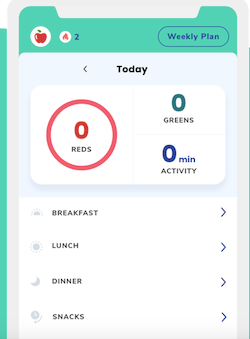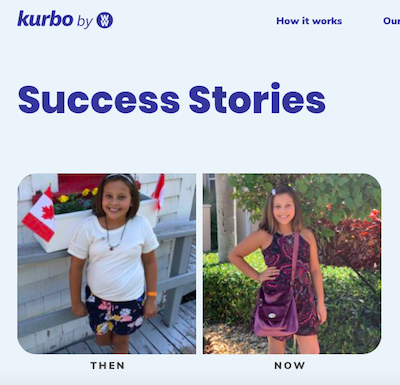It's been one of those weeks again where the groups I follow on social media have gone crazy discussing the new App from WW.
If you haven't heard about it, in the US, Canada and Singapore, WW (newly rebranded from WeightWatchers) have launched an App, Kurbo, aimed at children aged 8-17 years. If you have followed us for a while, it won't be a surprise to learn that we do NOT think this is a good idea.

However, opinions in the deep and dark areas of the internet known as the 'comments' are very much divided on this. What I've found interesting is why there is such a disparity in people's opinions; it's not because people disagree that we shouldn't be looking after our children in the best way possible, or even that people disagree that we should be helping our children to be fit, healthy and happy. Nope, everyone who comments agrees on that. Instead, the disagreement comes from how we should be helping them achieve this. After all, if you've lost weight with WW or its similar counterpart SW, then it makes sense that you'd see the value in something like this. A simple App which will help children to understand which food is good to eat and which food is bad, right? After all, the App even uses a traffic light system which could be considered rather similar to the one we see on our processed food packaging. Where can be the harm in that? It even provides children with 'inspiring' before and after pictures of their peers who have lost weight with the Kurbo app and programme. Where can be the harm in that?


Well, unfortunately we believe there could be great harm. In fact, the very reason so many people can't see the potential harm is exactly the problem. The 'nutritional' ideas companies such as WW and SW, amongst others, teach are flawed and far removed from what should be considered a balanced diet. Additionally, these kind of diets promote a 'one-size-fits-all' approach alongside preaching an over-simplified mindset that if you just 'stick to the plan', you'll lose weight. Add into that the way in which we're encouraged to compare our bodies to others and build our self-worth on how many pounds we've lost; quite frankly, if we're about to engage children in the same culture, we've a mental health disaster waiting to happen!
At the end of this article, you'll find a footnote of references which will link you to evidence of the negative side-effects of restrictive dieting (in children and adults). In this post, we're going to focus on the side of things that's harder to evidence but that we know we've experienced ourselves, or have seen in our friends, family, colleagues and clients. The psychological effects of dieting... the way it makes us feel; because, I don't know about you, but I wouldn't wish any of these side-effects of dieting on any child of mine.
What about health AND happiness?
Perhaps one of the most distressing things for a parent to hear is the sound of her child putting themselves down. Looking in the mirror and pulling at clothes, picking at body parts, pulling a face at the appearance staring back is a learnt behaviour. Sometimes we learn it from the people we spend time with (particularly our own family members), sometimes it's a result of name-calling or mean comments from our peers, sometimes it's from the messages we receive from media such as TV, films, magazines and advertising, and sometimes the reasons are much deeper and darker than this. But it's hard to ignore that 'Perfect' images of young, beautiful people are paraded in front of us day in, day out; it's constant. This image of 'perfection' is naturally unachievable for 95% of the population! Don't worry though... you can buy this product, that product and those products in exchange for the extortionate price of your confidence, self-esteem and happiness!

The beauty/wellness/weight-loss industry (aka Diet Culture) is worth multi, muti, multi billions and they prey on your insecurities because without those daily doubts and worries, you wouldn't spend your hard-earned money!
We're told it will make us happy. Honestly, think about it now... how many times have you thought to yourself, I'll be happy when I weigh X, or can fit into Y, or I'll start Z when... you know what we mean, you've been there and back - and there again - for so many years you've forgotten when you actually started thinking this way.
But there was a time when you didn't. There was a time when you were care-free about your body image. You ran, you played, you chatted confidently to people you'd just met and made new friends without a second thought of judgement. You ate freely when you were hungry, you enjoyed food without worrying how you were going to 'pay' for it later, you were active for the fun of it without a single thought of how many calories that activity burned! You were free.
That's childhood. And the longer we can keep it that way the better. Whenever it was that Diet Culture infiltrated your life, it taught you that you're unable to trust your own sense of hunger - but don't worry, there's an App for that! It taught you that you don't know if you've done enough exercise - but don't worry, there's an App for that. It taught you that you can't trust your own instincts because you are apparently lazy, and fat and stupid - but don't worry... there's an App for that!

Do we really want to introduce our children to this too?
Good vs Bad
In my (Maggie) time as a teacher, I noticed something really important about children. Labels are important. They gain a sense of identity via a label - flapper, mod, rocker, greaser, gansta, geek - they've existed throughout history in various forms and the label is important. Labels are also given to them - good, bad, naughty, studious, clever, quiet - and this label is important too. Because if there's one thing I noticed it's that no matter the label they received, 9 times out of 10 the child would strive to live up to it. The 'naughty boy' stops paying attention and plays the class clown, the 'clever girl' attends extra sessions because she's going to be the first in her family to go to university, the 'quiet child' never raises a hand or answers a question.
So what's this got to do with helping them 'lose weight' via an App which traffic lights food?
Firstly, this is specifically and wholly a weight-loss App; not a health App, not an activity App, not an educational App, not a happiness App... A WEIGHT-LOSS App.
Label?
Fat.
Seems harsh? That's because of the negative connotations our society associates with the word. When a young child uses the seemingly innocuous adjective 'fat' in a classroom, they're tutored not to be mean despite the fact that thin, short, tall are acceptable as descriptors. Fat has such a negative label attached to it that when applied to a person it instantly lowers self-esteem, imparts feelings of shame, invokes guilt, induces stress, causes depression and can potentially lead to disordered eating and eating disorders. And we should pause there for a moment on Eating Disorders and acknowledge that in a 2000-2009 study of diagonosed ED, the incidences were highest in girls aged 15-19 and in boys aged 10-14; they are vulnerable! In fact, research has shown us that even with the best of intents, labelling someone (adults or children) as fat or overweight doesn't acutually help them to become healthier at all. Instead such a label causes people to avoid physical activity and puts them more at risk of weight cycling (yo-yo dieting) which in turn leads to further health issues! Is this really something we want to subject our children to?
Real life experience matters
The development of an eating disorder is perhaps the most worrying side-effect of focusing a child on their weight, or more specifically on losing weight. Our own Spark Fitness coach, Aimi, has experienced this first-hand and 20 years on she's still working on extracting herself from the demons of the Bullemia which took hold of her. Concerned about her weight, the adults in Aimi's life thought, as many of us do, that the best way to support her would be to put her on a diet. Whether the diet itself achieved weight loss for the young Aimi is a moot point because this one, seemingly innocent, act of concern sent her into a spiral of weight cycling, physical and psychological self-harm which was to last for years.
Why?
"It wasn't just down to the diet," Aimi reflects, "But as a child, I perceived that the only person who provided the security I had in life was telling me that I had to be a certain size to be loved".

Make no mistake, the negative mental health impacts of dieting young children are real, dangerous and long-lasting.
Live a healthy, happy lifestyle together
Of course, none of this helps the concerned parent who's been told that her child needs to lose weight, or that his child's BMI is too high. In a world where we're constantly warned of the perils of obesity to do nothing seems tantamount to neglect. So what do you do? If you're concerned about your child's weight, but it's unhealthy to put them on a diet... what can you do?
Live a healthy lifestyle as a family... together.

Focus on health.
Be active, get outside, eat a range of balanced foods without fear, guilt or shame. Avoid labeling food and help children understand that all food is good in moderation, that food is energy, that food is nutritious, that food can also be social, fun and should not be feared. Talk about how amazing our bodies are and how even more awesome our brains are.

Look at how different out bodies are and celebrate those differences. Try out new, fun activites and embrace learning & developing a new skill. Avoid referring to your own body in a negative way and let them see that your health and happiness is more important to you than your appearance. Let them eat, and let them leave food when they've had enough - let them embrace their innate abilities as intuitive eaters as very often it's our own fear which leads them away from this. Help them to be as happy, healthy, fit and strong as they can possibly be and help them to understand that if they try hard and stick at it, they are capable of anything.

Gift them with the skills to view the world as critical thinkers and with a growth mindset that keeps them learning so that they become adults who are savvy enough to identify Diet Culture when it comes to get them, and so they understand instead how to fuel their bodies and live their lives to the fullest. Keep them safe, happy and let them know they are loved.
Give them all these things. Not a diet. And not a diet App.
Related evidence and studies:
Shared risk and protective factors for overweight and disordered eating in adolescents, 2007.
The weight of stigma: cortisol reactivity to manipulated weight stigma, 2014.
NEDA (National Eating Disorders Association) statement on KURBO by WW App
Medicare's search for effective obseity treatments: diets are not the answer, 2007.
